Major Works
by Robert A. Nisbet
Twilight of Authority
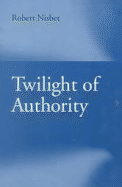
About this title: "We had thought, or
our forefathers had, that modern liberal democracy would be
spared the kind of erosion and decay that both Plato and
Aristotle declared endemic in all forms of state. Now we are
not so sure." So wrote Robert Nisbet in the first edition of
Twilight of Authority, published by Oxford University Press
in 1975. "The centralization, and, increasingly,
individualization of power is matched in the social and
cultural spheres by a combined hedonism and egalitarianism,
each in its own way a reflection of the destructive impact
of power on the hierarchy that is native to the social bond,
" he writes.
Sociological Tradition
About this title: When first published, The
Sociological Tradition had a profound and positive impact on
sociology, providing a rich sense of intellectual background
to a relatively new discipline in America. Robert Nisbet
describes what he considers the golden age of sociology,
1830-1900, outlining the major themes of nineteenth-century
sociologies: community, authority, status, the sacred, and
alienation. Nisbet focuses on sociology's European heritage,
delineating the arguments of Tocqueville, Marx, Durkheim,
and Weber in new and revealing ways.
The Present
Age: Progress and Anarchy in Modern America
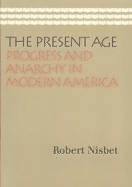
Quest for
Community
About this title: "The Quest for Community" stands
among the most important social critiques ever written. The
first book by the man the New York Times calls "one of our
most original social thinkers", Robert Nisbet's study
explores how individualism and statism have flourished while
the primary sources of human community - the family,
neighborhoods, the church, and voluntary organizations -
have grown weaker. First published in 1953, this timeless
work is a seminal contribution to the understanding of the
spiritual and intellectual crisis of Western Society. With a
new introduction by William A. Schambra that places the book
in a contemporary perspective, "Quest for Community"
deserves to be reread in the light of events that have
confirmed its provocative thesis.
Sociology
as an Art Form
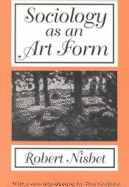
About this title: "One of our most original social
thinkers", according to the New York Times, Robert Nisbet
offers a new approach to sociology. He shows that sociology
is indeed an art form, one that has a strong kinship with
literature, painting, Romantic history, and philosophy in
the nineteenth century, the age in which sociology came into
full stature. Sociology as an Art Form is an introduction
for the initiated and the uninitiated in sociology. Nisbet
explains the degree to which sociology draws from the same
creative impulses, themes and styles (rooted in history),
and actual modes of representation found in the arts. He
shows how the founding sociologists such as Marx, Weber,
Durkheim, and Simmel constructed portraits (of the
bourgeois, the worker, and the intellectual) and landscapes
(of the masses, the poor, the factory system), all
reflecting and contributing to identical portraits and
landscapes found in the literature and art of the period. In
addition to marking the similarities between sociologists'
and artists' efforts to depict motion or movement, Nisbet
emphasizes the relation of sociology to the fin de siecle in
art and literature, with examples such as alienation,
anomie, and degeneration. He creates an elegant, brilliantly
reasoned appraisal of sociology's contribution to modern
culture.
Conservatism: Dream and Reality
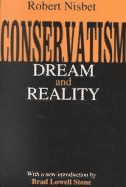
About this title: The essential concerns of
conservatism are the same as those that motivated Nisbet's
first and most influential book, The Quest for Community. In
fact, Conservatism unites virtually all of Nisbet's work. In
it, Nisbet deals with the political causes of the manifold
forms of alienation that underwrite the human quest for
community. The sovereign political state is more than a
legal relationship of a superstructure of power, it is
inseparable from its successive penetrations of man's
economic, religious, kinship and local allegiances, and its
revolutionary dislocations of established centers of power.
Nisbet holds that although political philosophers are often
conceived in terms of their views of the individual and the
state, a more useful approach adds the factor of social
groups or communities mediating between the individual and
the state. Such groups comprise "society" the protection of
which is the "sole object" of the conservative tradition,
according to Nisbet. This conservative ideology arose in the
West as a reaction to the French Revolution and its
perceived impact upon traditional society. Edmund Burke was
the first spokesman of the new ideology. In this book,
Nisbet argues that modern conservatism throughout the West
can be seen as a widening of Burke's indictment not only of
the French Revolution, but of the larger revolution we have
come to call modernity. From Edmund Burke and his
contemporaries such as Bonald, de Maistre, Haller, and
Savigny, down to T.S. Eliot, Christopher Dawson, Michael
Oakeshott, Irving Babbit, Paul Elmer More, and Russell Kirk,
the essential themes of political conservatism remained the
same. They are centered upon history, tradition,
property,authority, liberty and religion, and attack equally
the political collectivism and radical individualism that
have the same irrational outcomes. Nisbet makes the point
that, at present, conservatism is also in a crisis, one
created in large measure by mixing in the political arena
economic liberalism and welfare state socialism -- a lethal
mix for conservative politics.
Sociology
of Emile Durkheim
History of
the Idea of Progress
Roosevelt
and Stalin: The Failed Courtship
Social
change and history; aspects of the Western theory of
development
Tradition
and Revolt
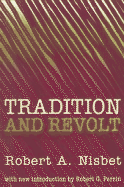
About this title: This classic volume deals with the
conflict between traditionalism and modernism. Nisbet
considers such subjects as power, community, culture, and
the university. He deals directly with the values of
authority, tradition, hierarchy, and community on the one
hand, and individualism, secularism, and revolt on the
other. Nisbet's underlying argument is that there is a close
historical relationship between the distribution of power in
democratic society and the displacement of social class,
kinship, neighborhood, and the church. The book challenges
concerned Americans to understand and address the basic
conflicts confronting contemporary society. In his
introduction, Robert G. Perrin notes that when these
writings first appeared, they stimulated and informed debate
on a broad range of topics such as value conflict,
leadership, community, sociology, social class, technology,
and the university. They also foreshadowed works yet to come
in Nisbet's long and distinguished intellectual journey.
The Social
Bond
Social
Change & History
Social
Philosophers: Community and Conflict in Western Thought
The
Degradation of the Academic Dogma
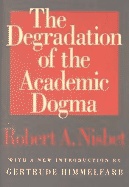
Dr.
Elwell's Home Page
©Frank Elwell
Send comments to [email protected]
.
|